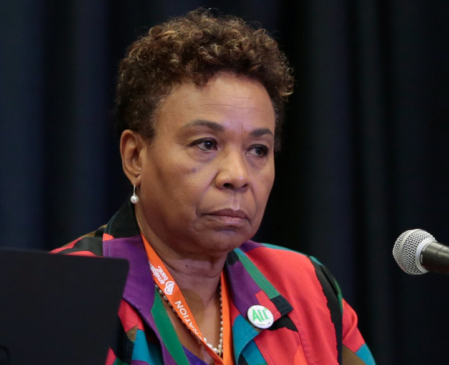WASHINGTON ― As Democrats plan for a potential future in which they have control of the U.S. House, lawmakers, candidates and outside groups close to the party are quietly preparing a new push against the overlooked war in Afghanistan.
The last time the party controlled the lower chamber of Congress, the U.S. had close to 50,000 troops in Afghanistan. Today that number is 15,000 — but it’s been eight years, and there’s still no clarity about when the longest war in American history will actually come to an end. President Donald Trump’s stated policy is that the U.S. presence has no time limit.
So Democrats are considering long-discussed proposals to torpedo the war’s entire legal justification — the sweeping post-9/11 congressional authorization that has been used to support U.S. military action well beyond Afghan borders — and tie funding for the campaign to clearly outlined strategic goals and troop reductions. There’s also talk of using new oversight powers to hold top officials, military commanders, defense contractors and foreign partners accountable for accusations of human rights violations, corruption and political posturing at the cost of human lives. And while party leaders are loath to commit to a particular course, they feel certain this is an issue their colleagues and their political base see as a priority.
A dramatic but now largely forgotten vote in June 2017 underscored why this is a natural fight for Democrats. House Appropriations Committee lawmakers from both parties voted for the first time for a measure long pushed by war critic Rep. Barbara Lee (D-Calif.) that would repeal the authorization. GOP leadership quashed the effort, but it clearly signaled that, after years of worrying about being seen as too dovish, Democrats have reached a moment when even the other party and its voters can seriously consider serious antiwar action.
“We’ve come a long way… from just one vote in opposition [when the authorization came up in 2001] to a widespread recognition among members of Congress that this was an overly-broad authorization that set the stage for perpetual war,” Lee wrote in an email to HuffPost. She sees Democratic unity on the issue today: “There’s a lot of common ground across the caucus around holding this debate and vote.”

Reuters
Outside figures in frequent contact with leading Democrats concur. “Ending the war in Afghanistan is not actually a fringe position in the Democratic Party,” said Kate Kizer of the progressive organization Win Without War. Ned Price, a former CIA official who worked for Obama and now helps run a group called National Security Action, agreed, noting that any divide is more on how to change course without breeding instability than the question of whether it’s time to do so.
That doesn’t mean the debate will be easy. It will pit lawmakers content with the status quo against figures formerly seen as fringe and vocal new colleagues critical of the Democratic political machine — many of whom fault President Barack Obama for ultimately abandoning his goal of bringing home the last U.S. troops from Afghanistan. And it will involve balancing lawmakers’ divergent priorities, from campaign finance reform to health care. The hope among its proponents is that the energy ― of new candidates, of resistance to Trump, of dissatisfaction with current politics ― is on their side.
“If you look at the new members who are coming into Congress, many of these folks, as well as a good proportion of the American public, were all preteens when this war started,” Kizer said. “So I think as the war continued, there’s a real question of, what are we doing?”
If you look at the new members who are coming into Congress, many of these folks, as well as a good proportion of the American public, were all preteens when this war started.
Kate Kizer, Win Without War
Any debate will be informed by the well-documented failures of American plans to reform Afghanistan and develop a government and security structure that can prevent it from again becoming a playground for violent groups that might target the U.S. The Afghan government now controls only slightly more than half the country, a congressionally mandated inspector general reported on Nov. 1 ― the lowest level since the watchdog began its tracking. The rest of the nation is under the sway of the Taliban, the hard-line group the U.S. deposed, and other organizations like the Islamic State.
“I have long been a proponent of a negotiated, diplomatic solution to the war in Afghanistan and for an end to this war period. Unfortunately, the war in Afghanistan has gotten us further ― not closer ― to achieving those goals,” wrote Lee, who’s expected to take on a new House leadership role in the next Congress.
From War Vote To Peace Bills
Lee began confronting the prospect of endless war three days after the attacks of 9/11.
Democrats have since then tried to challenge the legal justifications for wars in the House and Senate, pressure the executive branch ― including Obama ― with votes against war funding and highlighted wastes of taxpayer money and other failures in implicit bids to call the whole endeavor into question. They have occasionally won Republican cooperation, but, in nearly every instance, Congress has tacitly blessed Pentagon-led requests for troop increases.
What’s different now is that years of worsening fighting on the ground make it harder to argue that the final Obama strategy continued by Trump ― of keeping U.S. troops in Afghanistan while officially saying that they’re not engaged in combat and that peace is possible ― is working. Meanwhile, Trump’s own rhetoric questioning foreign policy orthodoxies and divides with his party on issues like trade and U.S. alliances have made it easier for lawmakers and outside groups to consider national security shifts that might have been taboo before January 2017.
“The menu of options hasn’t changed much in the past 10 years,” said Shamila Chaudhary, a Johns Hopkins University analyst who served in the White House under Obama, noting that Democrats and Republicans have both spent years worrying about what might happen in Afghanistan without a U.S. presence.
But it’s easier to make different choices from that menu.
With the Trump administration pushing a new high-level attempt at talks between the U.S.-backed Afghan government and the Taliban movement while simultaneously ramping up troop numbers, Democrats can lead congressional pressure for actual progress toward a negotiated peace, Lee wrote.
Former Obama advisers are already supporting the effort by pointing to their own success in small-scale engagement with the militant group ― helping make clear that the approach is hardly a Trump innovation.
Rep. Adam Smith (D-Wash.), who will chair the House Armed Services committee if the Democrats take the House, is expected to use hearings and expanded powers to scrutinize Pentagon arguments.
And Trump’s reluctance to talk about human rights issues leaves the field to Democrats to highlight problems like Afghan military abuses and support for warlords, Chaudhury said, bolstering their general case for an ultimate end to the conflict.
With soldiers now enlisting who weren’t even alive when the U.S. invaded Afghanistan, the years-long mushrooming of reasons to question the war means nearly every kind of lawmaker can get behind one, staffers and activists say.
New Voices In The Chorus
Amy McGrath is used to people wanting to talk Afghanistan. They ask the retired Marine lieutenant colonel, a Kentucky Democrat who’s become one of the best-known candidates for office this election cycle, why U.S. troops are still there and say it feels like America is losing. She told HuffPost she responds by creating a dialogue ― she understands the frustration, but she feels at least some degree of American assistance is essential to prevent the creation of a militant haven.
She’s quick to note that she hasn’t been there since 2010, when she served her last tour in Helmand province.
That still, of course, gives her a degree of on-the-ground experience way beyond that of the vast majority of her future colleagues if she wins her tight race.

Adam Beam/ASSOCIATED PRESS
“Congress for the last 17 years has totally punted it because they don’t want to be held responsible,” McGrath said of the debate over how to handle the war. “This is ridiculous.”
Two groups loom large in the crop of candidates key to the Democrats’ hopes of taking the House and general energy around the party this year. Both will likely feature heavily in conversations about issues like Afghanistan.
Military veterans like McGrath and civilians who have worked in national security, like Abigail Spanberger in Virginia, Elissa Slotkin in Michigan and Andy Kim in New Jersey, have pitched their first-time campaigns as part of a lifelong call to duty on behalf of the country. Many of them are close to foreign policy experts ― both Spanberger and McGrath have been in contact with Obama aides involved in the National Security Action group, spokespeople told HuffPost ― who see Trump as a danger to important U.S. engagement around the world and are wary of radical change.
The other circle is identified with more proudly left candidates: Alexandria Ocasio-Cortez in New York, Rashida Tlaib in Michigan, Ayanna Pressley in Massachusetts, Ilhan Omar in Minnesota and Ammar Campa-Najjar in California. They’re less vocal on foreign policy but are expected to line up with already elected allies, such as antiwar leader Rep. Ro Khanna (D-Calif.). They’re all endorsed by the Khanna-linked group Justice Democrats, which was formed by former presidential campaign staff for Sen. Bernie Sanders (I-Vt.). For now, they and their partners on Capitol Hill are focusing on the groundwork for a stronger progressive role in Congress more than on specific issues, a Democratic aide familiar with the interactions with HuffPost.
Shaped by similar experiences and politics, those groups are likely to rely on each other as they grapple with thorny new problems in their new jobs, united also by the sense of being newcomers.
“When we get together, we sort of all get it… we have all been over there, we know it,” McGrath said. Rep. Conor Lamb (D-Pa.), a Marine veteran who won a special election earlier this year, told HuffPost he hadn’t yet heard of the progressive effort to withdraw from Afghanistan.
When we get together, we sort of all get it… we have all been over there, we know it.
congressional candidate Amy McGrath, a military veteran
But the blocs already agree on key fundamentals like resisting Trump’s attacks on the Affordable Care Act or the need for changes to Democratic leadership in the House. On Afghanistan, too, the distinction doesn’t have to lead to a clash ― deep blue or only marginally Democratic districts nationwide seem fed up. Both sides told HuffPost that for now they’re optimistic about working together.
“I’m encouraged by the number of veterans and national security officials running for office,” Lee wrote. “No one understands the costs and consequences of these wars better than them.”
And the next few weeks ― right after the midterms ― could show how that kind of cooperation is already happening.
A Post-Midterm Model
Democrats hope to move by December against a different war: a U.S. campaign of aerial refueling, intelligence support and arms sales for Saudi Arabia and the United Arab Emirates, who are jointly fighting a militant group supported by Iran in Yemen. It’s a dry run of sorts for the Afghanistan fight.
The Yemen war, which began after the pro-Iran Houthi movement seized the capital from a Saudi-backed government, has produced the world’s worst humanitarian crisis and bipartisan outrage in Congress reflected in increasingly tight votes on arms sales.
Now Sanders, Khanna and others want the House and Senate to vote up or down on bills that would end U.S. support for the Saudi-UAE coalition altogether ― and with United Nations warnings about the risk of famine growing more dire and outrage about U.S.-Saudi relations after the killing of Saudi journalist Jamal Khashoggi, they feel the time is ripe.
A Democratic aide involved in the measure pointed to the support of the No. 2 House Democrat, Rep. Steny Hoyer of Maryland, Smith of the Armed Services Committee, powerful Reps. Nita Lowey (D-N.Y.) and Eliot Engel (D-N.Y.), and scores of others, including some notable Republicans. In the Senate, Sanders and his allies had managed to win over more than half the chamber in the spring.
Asked why not wait, particularly if the House does swing blue, the aide noted the fears of widespread starvation in Yemen and the belief that a vote against the war might send an important signal, putting the ball in Trump’s court and setting Democrats up to press him in the new Congress.
Presaging likely battles on Afghanistan and other controversial engagements like in Syria, the hope is the Yemen fight will unite Democrats around the U.S. war that’s perhaps hardest of all to justify and show the party’s base that its representatives can get things done.
“Congress has not reasserted its power on war-making for a very, very long time,” said Kizer, the Win Without War activist. “So these war powers fights show they’re starting to exercise that muscle and understanding that the public wants them to take up these hard votes.”
Or really, elections matter.
“With this hopeful blue wave around trying to curb an out-of-control president, trying to rein him in in all forms and re-energize Congress as a co-equal branch, I think that that will also lend itself to building a more humane, restrained U.S. foreign policy,” the aide said.
Daniel Marans contributed reporting.










